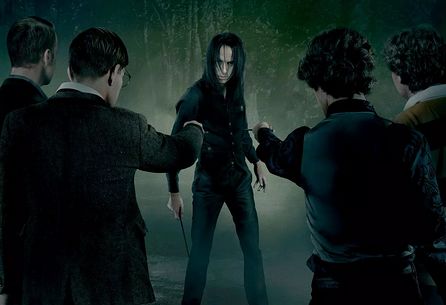To say that Sherlock Holmes – as portrayed by the delectable
Benedict Cumberbatch in BBC’s hit show ‘Sherlock’ – does not feel emotions
would be to do an egregious disservice to the character. This is a man who
literally shoots the walls when bored, wanders about the Buckingham Palace buck
naked just to spite his brother and, in The Reichenbach Fall, dramatically
falls off a building to impress his friend Dr. Watson. Sherlock is anything but
unemotional. What he is, is improperly
emotional. He feels emotions fine, just not the ones he’s supposed to feel at any given point of time.
Yet, why is it that all of us at one time or another have
connected the word ‘ emotionless’ to Sherlock Holmes? Why do so many of us
harbor the misconception that Mr. Holmes, perhaps the most emotionally volatile
of all the show’s numerous characters, is a cold, unfeeling sociopath? We think
it, not because that is what Sherlock really is, but because that is what he wants to be; how he wants the world to
see him.
The question then, is why?
And the answer is pretty simple, really.
It is not Sherlock,
but Mycroft who is Irene Adler’s Iceman. It is Mycroft who is the unemotional
one, at least when it comes to everything but his little brother Sherlock.
And it is big brother Mycroft who has taught Sherlock
everything he knows. It is from Mycroft that Sherlock had learned the art of
deduction, one of the most integral parts of his personality; Mycroft who
appears as the judge and jury of his mind palace. Is it any surprise, then,
that it is Mycroft’s idea of a
perfect mind that Sherlock is trying so desperately to emulate, consciously or
otherwise? It is not Sherlock but Mycroft who had always considered emotions to
be a superfluous weakness, and for the longest time Sherlock had believed his
big brother with the blind faith of a child.
It was only the advent of the proudly sentimental Dr. Watson
in his life that had made Sherlock question that deeply ingrained notion for
the first time. Still, old habits die hard and it will take a few seasons yet
for Sherlock to come to see his emotions for what they really are: an asset to
be harnessed to its full potential, rather than a liability that needs to be
suppressed and denied.
Fear not, though. There is hope yet. The Season 3 episode
‘The Sign of Three’ gave us this gem of a conversation between Mycroft and
Sherlock –
Loathe as he is to admit the fact, clearly Sherlock is
involved, very much so. Mycroft sees it, and subconsciously so does Sherlock, though
the indoctrination will take some time to wear off yet. But as Sherlock tells
his brother, ‘he is not a child anymore’,
and sooner or later he must emerge from under big brother’s protective
psychological wings and spread his own.
MYCROFT:
Well, it’s the end of an era, isn’t it? John and Mary – domestic bliss.
SHERLOCK:
No, no, no – I prefer to think of it as the beginning of a new chapter.
Mycroft smiles.
SHERLOCK:
What?
MYCROFT:
Nothing!
SHERLOCK: I
know that silence. What?
MYCROFT:
Well, I’d better let you get back to it. You have a big speech, or something,
don’t you?
SHERLOCK:
What?
MYCROFT:
Cake, karaoke ... mingling.
SHERLOCK (angrily):
Mycroft!
MYCROFT:
This is what people do, Sherlock – they get married. I warned you: don’t get
involved.
SHERLOCK:
Involved? I’m not involved.
MYCROFT: No.
SHERLOCK:
John asked me to be his best man. How could I say no?
MYCROFT:
Absolutely!
SHERLOCK:
I’m not involved!
MYCROFT: I
believe you! Really, I do! Have a lovely day, and do give the happy couple my
best.
SHERLOCK: I
will.
MYCROFT:
Oh, by the way, Sherlock – do you remember Redbeard?
SHERLOCK (angrily):
I’m not a child any more, Mycroft.
MYCROFT:
No, of course you’re not. Enjoy not getting involved, Sherlock.
Objectivity might well be Mycroft’s weapon of choice, but as
Sherlock’s psychological warfare with Moriarty has proven again and again,
subjectivity too can be its own kind of lethal ammunition. It takes fire to fight
fire, after all, and dry logic in itself could never have defeated a mind such
as Moriarty’s. It was Sherlock’s understanding of Irene’s love for him that did
what Mycroft couldn’t, and saved the day – and the country – in ‘A Scandal in
Belgravia’, beating the consulting
criminal’s painstakingly woven plan. Sherlock, whose instinctive,
sentimental protectiveness for Watson and his family put an end to the evil
that was Magnussen.
Perhaps, then, the day is not far when Lestrade’s prediction
will come true – and Sherlock Holmes will be not only a great man, but a good
one too!




